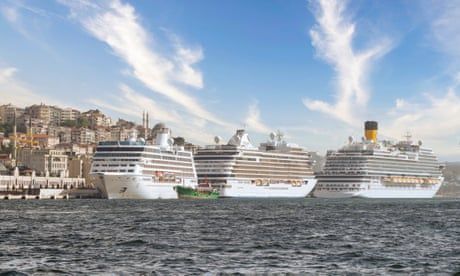
The environmental harm caused by this shapeshifting, underregulated industry must be tackled
Local pushback against cruise ships in the world’s top tourist destinations is nothing new. More than three years ago, these vast vessels were barred from Venice’s lagoon on grounds of the risk they posed to the city’s historic buildings. This summer, cruise ships in Amsterdam and Barcelona were targeted by protesters, on grounds of chemical pollution but also as part of a wider movement against overtourism (as the negative impacts of huge influxes of visitors have become known). But – as revealed this week in a series of Guardian articles, The real cost of cruises – the environmental and social impact of this fast-growing industry goes way beyond individual cities, and requires action on a global scale.
The carbon emissions of a cruise are roughly double that of the equivalent flights plus a hotel stay. The industry is also responsible for a vast quantity of waste discharged directly into the sea, as well as high levels of toxic air pollution in the ports where ships are docked – usually with their engines running. Once seen as the exclusive pursuit of a minority of wealthy retired people, these holidays are now mainstream, with vast floating resorts designed and marketed for families and young adults. The largest ships have up to 20 floors and room for several thousand people.
Do you have an opinion on the issues raised in this article? If you would like to submit a response of up to 300 words by email to be considered for publication in our letters section, please click here.
Continue reading...